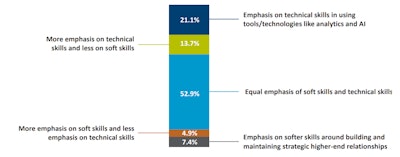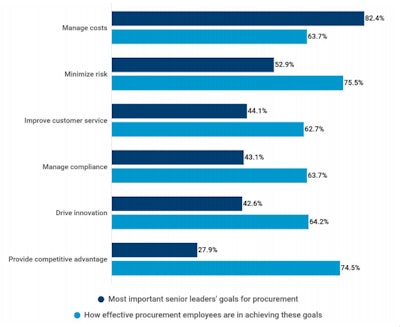
New market realities are changing the procurement landscape and increasing demand for skilled talent in the function. With credentialing often falling short of expectations and few universities offering degrees in procurement or sourcing, organizations will need to develop the next generation of procurement talent in-house. However, recent research by APQC shows that many organizations are not prepared to do so.
APQC surveyed 204 global procurement professionals to identify the top ten skills for the future of procurement. Social or “soft” skills dominated the list, claiming five out of ten spots. For the practitioners and subject matter experts we interviewed in the research, this finding was not a surprise. As David Frydlinger put it, “Organizations seeking to work more collaboratively with their suppliers to drive continuous improvement and innovation need to realize that social skills are important.” And yet, only 12 percent of those surveyed said they are focusing their talent development investment in soft skills. In fact, almost three times as many said they focus more on technical “hard” skills (Figure 1). Emphasis of Procurement’s Investment in Skills Development for Non-Management Employees
Emphasis of Procurement’s Investment in Skills Development for Non-Management Employees
This is a huge disconnect. Technical, job-specific skills are important, but only one made APQC’s top ten list: supplier relationship management (SRM). Even with SRM, soft skills are crucial. SRM theories and methods are technical, but effective application of SRM also requires softer skills such as communication and stakeholder management. Organizations need to realign their procurement talent development approach to focus more on social, general business, and deep work skills.
The first step professionals should take is to engage senior leaders to support a shift in procurement talent development. Fortunately, the research indicates that the foundation for such a shift is already present within most organizations. A wide majority of survey respondents (84.8 percent) say talent development is a recognized priority for procurement, and nearly 55 percent of CPOs and procurement directors say they view training as an essential or high priority. However, there’s also evidence that this broad sentiment may be misaligned with executives’ goals and expectations for the function. Most respondents report that senior leaders are still focused on costs and risks rather than the other benefits procurement can provide, such as competitive advantage and innovation (Figure 2). Senior Leadership Goals vs. Effectiveness of Achieving Goals
Senior Leadership Goals vs. Effectiveness of Achieving Goals
This could be a roadblock to investing in the right approaches to develop in-demand skills, so procurement needs to change the conversation from costs and risks to value generation. Our current moment is an excellent time for such a conversation: With COVID-19, the need for procurement professionals with skills in communication, stakeholder management, business ethics, and complex decision-making is clearer than ever. If budgets are tight, consider advocating for low-cost approaches such as mentoring, virtual job shadowing, and job rotations. These forms of on-the-job learning are effective ways for employees to gain social and business skills.
The second step professionals should take is to partner with HR to realign talent development with critical future skills. A strong partnership combines HR’s employee-centric support and direction with the function’s operational knowledge of necessary skills. APQC’s survey found that most procurement talent development programs already have a strong mix of components (e.g., competency models, learning portals, career paths, learning profiles) to evaluate performance and present employees with clear development opportunities. But whether these are used effectively is another question. Since less than one third of respondents said they are effectively developing any of the top ten skills, the answer to that question appears to be “No.”
Procurement teams must work more proactively, transparently, and creatively with both HR and executives to shape talent development investments and strategy. For example, a majority (67 percent) of organizations plan to increase investment in tools and technology to deliver learning for procurement staff. Online learning isn’t always a bad choice, especially if you’re investing in hybrid online/on-the-job courses. But if you need to develop employees’ soft skills, it may be better to focus investment on employee and manager time (and incentives) for development.
More in-house, on-the-job development approaches can be a competitive differentiator in securing, retaining, and leveraging procurement talent. Consider the fact that only 34.8 percent of respondents in APQC’s research say they use job rotations outside of the procurement or supply chain function to develop employees. Moving procurement people out into the business—and moving people in the business into procurement—on a temporary basis offers significant potential to help young professionals hone skills like business ethics, stakeholder management, and communication. It can also help the business better understand how procurement works and the value it delivers.
The bottom line is, procurement leaders should use all the tools at their disposal—including certification programs and online trainings—to develop the next generation of procurement talent. However, they should also recognize that much of this work must be done in-house. Many in-demand skills, like critical thinking and relationship building, take time to develop and are impossible to fully acquire without real-life, practical experience. Procurement newcomers need to observe skilled negotiators and thoughtful decision makers. They need guidance and mentorship from leaders who care about their future and the future of the profession. Perhaps most of all, they need defined career paths and clear opportunities to hone their skills.
This article is part two of a two-part series on the skills gap in procurement. To learn more about the trends driving demand for skilled procurement talent, see Closing the Skills Gap in Procurement Part 1: The Problem.













